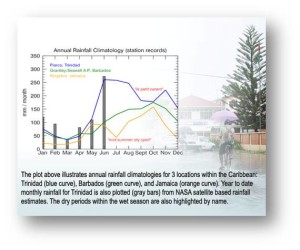 On August 19, 2011, IEDRO’s Manager of Site Operations, Teddy Allen, had a productive meeting with the National Foodcrop Farmers Association (NFFA) in the southern Caribbean island of Trinidad. To date, the group of Trinidadian farmers has never been approached by any climate or meteorology specialists to disseminate data and information to their farming community; nor have they ever been approached by international climate applications researchers (maybe this is less surprising) to assess the specific needs of local farmers.
On August 19, 2011, IEDRO’s Manager of Site Operations, Teddy Allen, had a productive meeting with the National Foodcrop Farmers Association (NFFA) in the southern Caribbean island of Trinidad. To date, the group of Trinidadian farmers has never been approached by any climate or meteorology specialists to disseminate data and information to their farming community; nor have they ever been approached by international climate applications researchers (maybe this is less surprising) to assess the specific needs of local farmers.
Despite the general unawareness of what related data exists, NFFA members would like to see examples of climate products and to be involved in the overall climate applications process. By doing so, they openly believe that progressive steps towards precision agriculture could be made. Teddy agreed to send along a simple NDVI / EVI remote sensing analysis by early October that could show trends in vegetation health on the island. They were EXTREMELY interested in this possibility to combine modern NASA satellite technology with their current knowledge to produce a better understanding of intra and inter-annual vegetative variability.
In the meantime, Teddy produced and sent rainfall plots pertaining to the general Caribbean mid summer drought and the colloquial petit carem (as known in Trinidad). NFFA members were curious to see how the petit carem varied across the Caribbean region.
We are excited at the prospect of developing a positive and productive relationship between data keepers and data seekers. Without the use of digitized historic data much of the information desired by groups such as the NFFA would be unavailable.
The Environmental Data Rescue Organization (IEDRO) is a US-based, 501(C)(3) nonprofit organization with volunteers worldwide that rescue and digitize historic weather observations throughout the world. Our efforts are supported and endorsed by the National Oceanic and Atmospheric Administration, the World Meteorological Organization and other international groups concerned with the preservation and digitization of this valuable data.
Rescuing historic environmental data and giving forecast information to those who need it the most will do more to prevent humankind’s suffering and death than any other endeavor. These data help to conduct climate change and global warming research, forecast disease spread, improve flood forecasts, and thousands of other vital uses. Only with accurate information about the past can we make the necessary preparations for the future. To learn more about us, please visit our website at www.IEDRO.org.

Comments are closed.